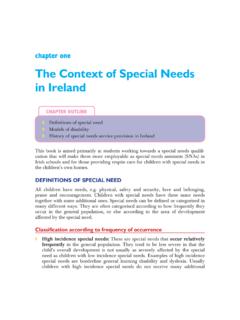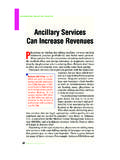Transcription of 1 Understanding social care - Gill - Home
1 1 Understanding social careKevin Lalor and Perry ShareOverviewThere is a good chance you are reading this because you are planning to be, or already are, a social care practitioner. Yet for many in Irish society, even those entering the field themselves, the meaning of the term social care is not self-evident. A common question directed at social care students and professionals alike is, What do you do? Misconceptions abound and in many cases practitioners are not accorded the recognition or status they deserve, partly as a consequence of a limited Understanding of what the term chapter explores the notion of social care itself. Some definitions are examined, phrase by phrase, to see what is involved. A short history of social care in Ireland is provided, placing the current set of institutions and practices in a historical context.
2 Aspects of social care practice are described, such as what qualities practitioners possess; what sort of work is involved; what practitioners do and where they do it; how much they get paid; and the difference between a social care practitioner and a social worker. It is hoped this opening chapter will answer some of the basic questions voiced by students, practitioners and social care PracticeIt is difficult to define social care practice. Indeed, it has suited governments and some agencies not to have a standard definition as it helps keep salary and career structures vague. As of March 2013, full implementation of the Health and social care Professionals Act 2005, the legislative basis for defining social care practice, has yet to occur. A linked issue is the contested notion of social care as a profession.
3 There is something of a chicken-and-egg situation here: it can be hard to define social care because of the lack of a clearly identifiable profession we can point to as practising social care ; this in turn makes it hard to pin down what social care practice might hope that by the time you have read this book, and certainly if a student by the time you qualify, you will have a clearer idea of what social care practice means. Inevitably, this will be complex: you will have become aware of social care s flexible nature; its contested position vis- -vis other practices and ASC Part 325/07/2013 15:364 Applied social Careoccupations (such as nursing, social work, counselling, occupational therapy); and, above all, its dynamism.
4 social care is a rapidly changing and developing field, in Ireland as elsewhere. We hope that you pick up something of this energy from this book, from your studies, from your interpretation of the world around you and from your own practical concise definition agreed over a decade ago by the Irish Association of social care Educators, the body that represents the educational institutions in the field, is that social care is:.. a profession committed to the planning and delivery of quality care and other support services for individuals and groups with identified needs. This definition is sketchy and could be applied to many helping professions. Nevertheless, it incorporates a number of key terms that help to mark out the professional territory of social care practice.
5 Let us deconstruct it: a profession social care practice is not just an ordinary job. Nor is it done on a voluntary or amateur basis, which distinguishes it from the (equally valuable) care that is carried out informally in Irish society by family and community members. Professionalism implies an occupation with some status that requires access to a specific body of skills and knowledge. planning and delivery social care is not just about providing services, it is also about devising and planning them. This process requires various skills and types of Understanding ; for example, an ability to provide hands-on care and support to people, an ability to identify what people require, an ability to plan accordingly, preferably drawing on available evidence and policy guidance, and an ability to communicate directly with people in an authentic way.
6 Quality care and other support services social care is about the provision of quality care , and also about providing other supports. For example, advocating on behalf of another, turning up in court to speak before a judge or knowing where best to refer a person who has a specific problem. individuals and groups social care can be provided on a one-to-one basis, but it can also involve working with a small or large group or a community. It requires well-developed interpersonal communication skills and a good knowledge of group Part 425/07/2013 15:36 Understanding social care 5 with identified needs social care practitioners in Ireland (as in many other countries) have traditionally worked with children, young people and people with disabilities, who are in the care of state or voluntary organisations.
7 While caring for these groups remains an important task, social care practitioners now work with a broader range of people, of all ages, who have special needs or vulnerabilities. There are people whose needs have been identified only recently, such as survivors of clerical sexual abuse or children with hyperactivity disorders. New sets of identified needs may emerge at any time. For example, due to recent immigration patterns, it is quite likely that there will be a need for ethnically appropriate care of older people in Ireland in the future. The dynamic nature of society helps to explain why social care is a constantly changing field of , even a single sentence can constitute quite a complex definition!A second definition (more a description) of social care work emerged from a 2011 consultation with practitioners, managers and educators.
8 Members of the Irish Association of social care Workers (IASCW), Irish Association of social care Educators (IASCE) and Resident Managers Association (now, Irish Association of social care Managers, IASCM) were asked by the Professional Regulation Unit of the then Department of Health and Children to suggest a definition that would capture the full range of activities involved in social care work. This definition would facilitate the translation of overseas qualifications for people coming to work in Ireland, especially from other parts of the European Union. The following description of social care work emerged: social care workers plan and provide professional individual or group care to clients with personal and social needs.
9 Client groups are varied and include children and adolescents in residential care ; young people in detention schools; people with intellectual or physical disabilities; people who are homeless; people with alcohol/drug dependency; families in the community; or older care workers strive to support, protect, guide and advocate on behalf of clients. social care work is based on interpersonal relationships which require empathy, strong communication skills, self awareness and an ability to use critical reflection. Teamwork and interdisciplinary work are also important in social care core principles underpinning social care work are similar to those of other helping professions, and they include respect for the dignity of clients; social justice; and empowerment of clients to achieve their full care practice differs from social work practice in that it uses shared life-space opportunities to meet the physical, social and emotional needs of clients.
10 social care work uses strengths-based, needs-led approaches to mediate clients presenting Part 525/07/2013 15:366 Applied social CareSocial care workers are trained, inter alia, in life span development, parenting, attachment and loss, interpersonal communication and behaviour management. Their training equips them to optimise the personal and social development of those with whom they work. In Ireland, the recognised qualification is a 3-year Level 7 degree. In Europe, social care work is usually referred to as social pedagogy and social care workers as social description of social care work contains most of the elements of previous definitions and attempts to describe roles, values and formation of professionals in the field.














